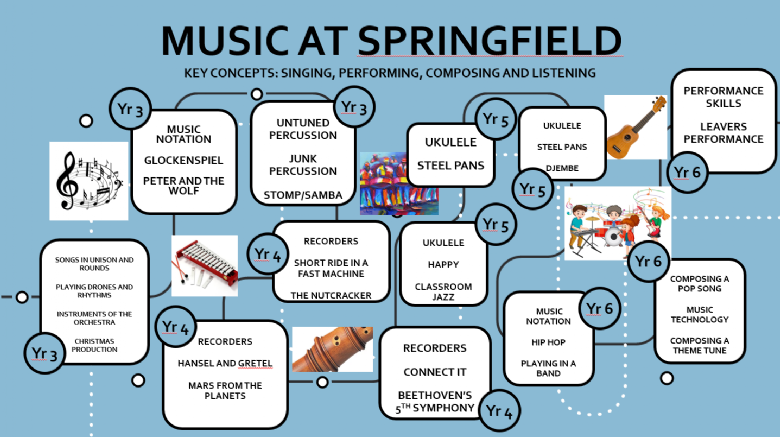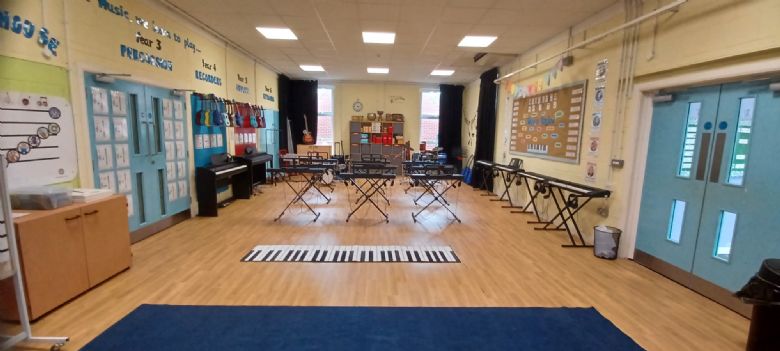Music
Music at Springfield

What is the intent of the music curriculum at Springfield?
Music is a powerful, unique form of communication that can change the way pupils feel, think and act. It transcends different cultures, abilities and generations – stimulating responses on both emotional and intellectual levels. It allows opportunity for personal expression and plays an important part in the personal development of an individual.
At Springfield Junior School our Music curriculum aims to promote the enthusiasm for, and the enjoyment of, music in all its forms. Our goal is for the children to develop musical skills and knowledge through effective teaching where children are fully engaged in their learning. By engaging children in musical experiences, we offer our children opportunities to develop skills, attitudes and attributes that can support learning in other curriculum areas as well as developing life skills such as listening, the ability to concentrate, creativity, self-confidence and a sensitivity towards others and the environment.

How is music taught? (Implementation)
Music is taught by a specialist music teacher once a week for 45 minutes, using resources from, but not exclusive to, the Model Music Curriculum, Stave House, Charanga, BBC Ten Pieces, Young Voices and Sing Up. Children also take part in a 20 minute whole school singing assembly once a week.
Children learn to sing with control and expression, read different music notation, improvise and compose, and listen with understanding to music as well as learning about music in a historical context. Each year, children learn to play a different musical instrument:
Year 3 - Untuned and tuned percussion (glockenspiel)
Year 4 - Recorder
Year 5 - Ukulele
Year 6 - Keyboard
Music Concepts
-
Singing
-
Performing
-
Composing
-
Listening
Interrelated dimensions of music (elements of music): These are explored throughout each concept:
-
Pitch
-
Dynamics
-
Tempo
-
Timbre
-
Texture
-
Duration
-
Structure
Whole School Listening Project
Each month, a musical focus is chosen for the whole school. Children listen to a piece of music when entering assemblies and are encouraged to consider their opinions on the music they are hearing. They are given some information about the piece and composer and are then encouraged to discover more facts independently. The aims for the project are:
- To develop pupils' confidence in discussing a wide range of music.
- To increase pupils' ability to recognise culturally significant musical works.
- To encourage discussion around musical opinions, tastes and preferences.
Here are our foci for the Autumn term. We encourage our families to listen along at home using the YouTube links:
September: Mozart
October: The Beatles
November: John Williams
John Williams Greatest Hits Album
December: Jackson 5
Listen to Us Sing
The Springfield Rap
Utter Madness
Lend a Hand
Singing Assembly
How do we measure the impact of our curriculum?
Termly assessments are used to create a data picture that determines the successful teaching and retention of Music skills. Pupil voice allows us to determine if children can talk about their learning and use appropriate vocabulary to do so. Pupil voice also enables us to determine how successful our Music curriculum is and to adapt it where necessary.
Other holistic examples of positive impact of our Music curriculum could include:
-Development of emotional literacy and oracy skills
- Increased speaking and listening skills
-Space to develop sense of self/identity
- Increased engagement across the curriculum
- Increased confidence levels
- Increased collaboration between peers
- Active learning/increased fitness

